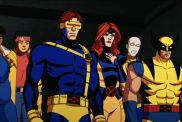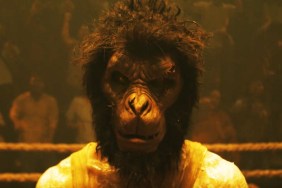
One aspect of The Master I avoided in my review was the often speculated relationship it holds to Scientology. It’s really all anyone wants to talk about until after they’ve seen the film. Philip Seymour Hoffman‘s character, Lancaster Dodd, is creating what is essentially his own religion in The Cause. People have drawn comparisons to Dodd’s efforts to those of L. Ron Hubbard and the early years of Scientology. It’s a fine comparison, but as far as the movie is concerned it really doesn’t mean much.
Tony Ortega at the Village Voice has gone so far as to say “you bet” The Master is a “Scientology movie” with three little segments comparing Dodd’s The Cause to Scientology. Without reiterating Ortega’s comparisons, in short, he hardly proves The Master is a “Scientology movie”, largely because it’s not. Then again, what does that even mean?
What are people looking for in The Master when they wonder if it’s a “Scientology movie”? My gut tells me they are looking for a slam piece. Something that shows Hoffman’s character as a charlatan that must be outed and flogged for his blasphemy. Therefore, comparisons to The Cause and Scientology are made to make it easier to dismiss what Dodd is selling.
Truth is, I would say The Master is actually sensitive toward Scientology and any religion for that matter. In fact, there’s one moment in the film I wished had been explored deeper on a surface level, but after thinking on it a bit more I realized there is more than enough to chew on as is.
At one point, while discussing The Cause in a room with devoted believers as well as non-believers, one man questions Dodd’s practice. The two argue and Dodd becomes visibly agitated, but in his frustration gives an appropriate response to the smiling bully in the corner. He says, “There is no use discussing this with you if you have already made up your mind.” In this instance, no matter who is right or wrong when it comes to the matter being discussed, Dodd is right in saying the conversation is over if one side is unwilling to listen to what the other has to say. This statement holds parallels to not only religious discussions but our current political process and countless other heated debates.
I don’t know much about Scientology, in fact I know little to nothing. I know there are words such as Engrams, Xenu, Sea Org and thetans. I know people are drawing comparisons between Dodd’s process of ridding his followers of past-life demons to some sort of “auditing” process done in Scientology. Very well, but that one line from Dodd rings through all of this as people write about the comparisons and for what? To validate their own beliefs? Is that how it works?

The Master is not about Scientology as much as Dodd’s “Cause” is a means of exploring the relationship between Dodd and Freddie Quell (Joaquin Phoenix), but not necessarily exclusively. There are fascinating moments such as Amy Adams playing Dodd’s wife, enraged at the disrespect shown toward her husband, suggesting the only way to be taken seriously is to go on the “attack”, a mindset many groups in today’s society feel they must follow to earn the respect they believe they deserve.
These little hints are in The Master, and to reduce it by comparing it exclusively to Scientology, I believe, is to overlook the larger societal meaning.
As a society we are afraid of things we don’t understand, this can have to do with religion, sexual preference, political beliefs and other lifestyle decisions. The reaction to The Cause in The Master is exhibited as an attack, not as reasoned discussion. In such an instance what will the people being attacked do? They will cling even harder to their beliefs, right or wrong, and suddenly the original message is lost in a storm of rage and defiance. I think it’s safe to say a lot of such rage was seen in the Occupy Wall Street movement recently and could even be used to describe the Tea Party. How we view these movements depends on how they are interpreted for us, largely by the media.
Pieces of this can also be seen in The Master as the film wears on and doubt begins to populate the minds of some of Dodd’s followers. Dodd is said to be making things up as he goes along and as soon as that seed is planted you begin looking for the evidence as a viewer. We search for the cracks in the facade to be able to point and say, “That’s bullshit!” primarily because we never took the time to listen to everything that was being said in the first place, afraid someone may prove what we believe wrong.
The Master uses The Cause as an exploration of the human condition between two men that won’t soon change despite their efforts and influences. Then again, I wonder if reducing it to a story of two men is even appropriate. I loved the triangle narrative between Freddie, Lancaster and Peggy (Adams), or is it more appropriate to refer to them as the wild dog, tamed puppy and the one holding the leash? Who was the true master and what does that mean? I think such a metaphor could relate to so many aspects of our society from religion to government to media.
The more and more I think about The Master, the more and more I enjoy it. Just like my review, as I wrote this piece more ideas bubbled to the surface, things begin to get a bit clearer while more questions go unanswered.









